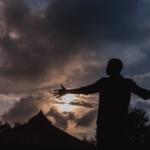Editor's Note: This is the third in a four-part series on wilderness spirituality called Going Cimarron.
In the wild, we are able to claim the radical stance of the prophet.
Unplugged and unpressured, we can gain the clarity to defy dominant consciousness, experience communion, find our true identity, and practice creative cultural resistance.
Check this out: Almost 3,000 years ago the people of Israel were shackled to the power of Babylon. Isaiah, one of their leaders, took the countercultural stance of the prophet and said to his people, "There is a voice calling: in the wilderness, make straight a path for the Lord." I believe Isaiah was saying: Away from Empire, clean up your act. You need to be remodeled. In the wilderness, change your head, change your allegiance, change your life.
We moderns tend to spiritualize Isaiah's challenging words, seeing wilderness as metaphor. Yet by avoiding a literal refashioning in the wilderness, we're left with impotent Christianity. We're left with millennia of earnest people who want to be followers of God but instead are hooked by the baubles of Empire. It's awfully hard to be divinely transformed when we're protected by, provided for, and utterly entranced by mother culture.
Safe in Empire's womb, we remain untested, entitled, and wholly dependent upon the teat of technocratic society. In this state, we can't begin to give birth to the kingdom of God in our lives. Held captive by Empire-based thinking, we can't begin to imagine the society Jesus envisioned: a place where violence does not have dominion over human interaction; a place where money does not have dominion over human exchange; a place where humanity does not have dominion over nature's cycles and limits. This kind of place can only be occupied by cimarrons, those who are free of Empire's value system.
Try this on: the degree to which you are addicted to Empire is the degree to which you depend upon money, technology and mother culture to meet your needs for food, shelter, security, entertainment, and identity.
The cimarron Desert Fathers who escaped the rise of Christendom in the 4th century took Isaiah's words seriously. Thomas Merton describes the earliest Desert Fathers as true anarchists: individuals who refused to let themselves be passively guided by a decadent state. Rather, in the desert they devoted themselves to crafting lives of integrity, refusing slavish dependence on conventional values.
Merton asserts that the Desert Fathers' flight to the desert was "a flight toward experience." What experience would that be?
An experience of limits
For modern Americans, wildland wandering is a form of fasting. When I dwell in wild places, living apart from civilization, I can't have it all: my needs must be met by what I can carry on my back and what I can find in my immediate environment. Kurt Hahn, the inspiring figure behind Outward Bound, knew that traveling in wilderness allowed groups of people to practice reasonable self-denial and crucial interdependence. This seems mundane enough, until we realize how countercultural such a situation is to the affluent modern person. To not have anything I want, just a click or a phone call away? To need other people to meet my basic needs? To be unable to buy my way out of boredom or hunger or discomfort? In Empire, such a situation is considered primitive, backward, undesirable. Wilderness gets us right with God by setting appropriate limits on our individual ego, activity, and greed.
An experience of Sabbath communion
Rainstorms. Mountains. The time the sun rises. In the wilderness, there is so much we cannot control. We simply must adapt, and say thank you for the blessings we get. We cannot influence our surroundings through our reputation, power, or wealth. In nature, a cash economy is absurd.
Wilderness becomes a Shabbat—sabbath, a time apart—for those of us addicted to Empire's cult of busyness and control. It gives us an enforced holy rest, exposing our restlessness. For many of us who think ourselves so important in society, the idleness of wilderness time is a shock—no big events to plan, no conference calls to make, no big product deadlines to meet, no house to maintain, no movies to watch, no internet to check up on. The Sabbath that comes from wilderness sojourn reminds us we are human beings, not human doings, and that we can love the world just as it is.
To adapt, appreciate, and accept—this is the heart of Sabbath communion, and the secret of being at home in wildlands. But this is scandalous to Empire-based thinking. People addicted to Empire do not fit into untamed communities of plants and animals, as members of the community; instead, we tame them.




